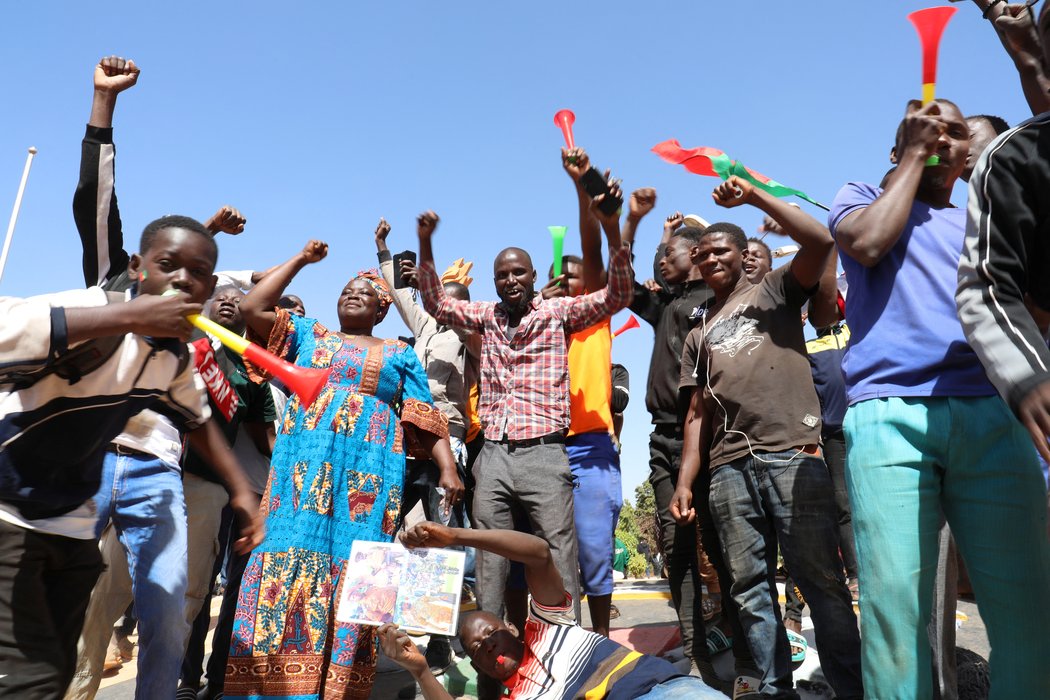What led to the military coup in Burkina Faso? pic.twitter.com/NPSRghQjMf
— DW News (@dwnews) January 25, 2022
Military coup
On 24th January 2022, military officers announced on the state broadcaster Radio Télévision Burkina (RTB) that it had removed President Roch Marc Christian Kaboré from office; suspended the Constitution; dissolved the Parliament and government; and closed the borders. The creation of the Patriotic Movement for Safeguard and Restoration (MPSR), the military junta’s executive body, was also announced. The suspension of the Constitution, however, was lifted a few days later on 31st January 2022 and Lieutenant-Colonel Paul-Henri Sandaogo Damiba was inaugurated as Burkina Faso’s president on 16th February 2022.
Prior to the military coup d’état, on 22nd January 2022, protests erupted in Ouagadougou, Bobo-Dioulasso, and other cities over the increasing insecurity due to jihadist violence and killings in Burkina Faso and the government’s inability to establish security. In Ouagadougou and Bobo-Dioulasso, clashes between protesters and security forces were reported. In Ouagadougou, where the protest was banned by local authorities on grounds of security concerns, anti-riot police used tear gas to disperse protesters, with some protesters erecting barricades and throwing stones at police. In Kaya, protesters ransacked the offices of the ruling party, Mouvement du Peuple pour le Progrès. Dozens of protesters were arrested.
The following day, on 23rd January 2022, gunfire was heard and mutinies occurred at several military barracks in the country; mobile internet was cut off (see under Expression); and a curfew was instated by President Kaboré, who was arrested by the military on 24th January 2022. Over a thousand of people gathered in Ouagadougou to celebrate the military takeover on 25 January 2022.
Regional bodies Economic Community of West African States (ECOWAS) and African Union (AU), suspended Burkina Faso’s participation following the coup.
Burkina Faso is the latest country on the continent to experience a military coup or takeover, after Mali (August 2020 and May 2021), Chad (April 2021), Guinea (September 2021) and Sudan (October 2021).
ℹ️ Confirmed: Mobile internet has been restored in #BurkinaFaso after ~35 hours offline 📈
— NetBlocks (@netblocks) January 24, 2022
Service was cut amid reports of a military uprising on Sunday morning, while the president was overthrown and parliament dissolved by the army.
📰Report: https://t.co/QBicJyLoUe pic.twitter.com/b4Bm2zVcGq
Expression
Journalists attacked or briefly detained and access to mobile internet disrupted
According to Reporters Without Borders (RSF), several journalists were obstructed and threatened during the mutinies in the days leading up to the military coup. On 22nd January 2022, military officers from the Sangoule Lamizane military camp accosted freelance journalist Henry Wilkins and Sam Mednick, who work for the Associated Press, while they were taking photos outside of the camp. Officers reportedly pointed their guns at them, confiscated their equipment, and detained the journalists for 30 minutes. On 22nd January 2022, a journalist with the media outlet La Chaîne au Coeur de l’Afrique, Ibrahim Compaoré, sustained an arm injury as a result of being hit by a projectile while covering the protests over the increasing insecurity in Ouagadougou (see above).
Access to mobile internet was cut for a period of 35 hours on 23rd and 24th January 2022. On 10th January 2022, access to the internet, Facebook, and some WhatsApp servers was also disrupted, as authorities announced arrests in connection to an alleged coup attempt.
On 19th January 2022, a spokesperson for the government, Alkassoum Maiga, said that Facebook was blocked due to security reasons and further said that authorities did not have to justify themselves over the disruptions to accessing the internet and Facebook. Moreover, Maiga reportedly said that:
“I think that if we have a choice between letting insecurity spread and taking measures that allow us to maintain a minimum control over the situation, then the choice seems clear to us that the national interest must take precedence."
Restrictions on access to Facebook and some WhatsApp servers have been ongoing since 11th January 2022, according to internet freedom organisation NetBlocks.
Burkina: une manifestation pro-russe non autorisée et dispersée https://t.co/xYn77piIQH pic.twitter.com/VHxdWMgOPF
— RFI (@RFI) April 24, 2022
Peaceful Assembly
Protest banned
On 23rd April 2022, protesters calling for military cooperation with Russia in Burkina Faso’s fight against jihadist groups and terrorism were dispersed by security forces, who used tear gas and arrested several protesters. The protest, organised by the Movement Burkina-Russia, was banned by local authorities who had asked the organisers to “postpone” the protest “in view of the security context”.
